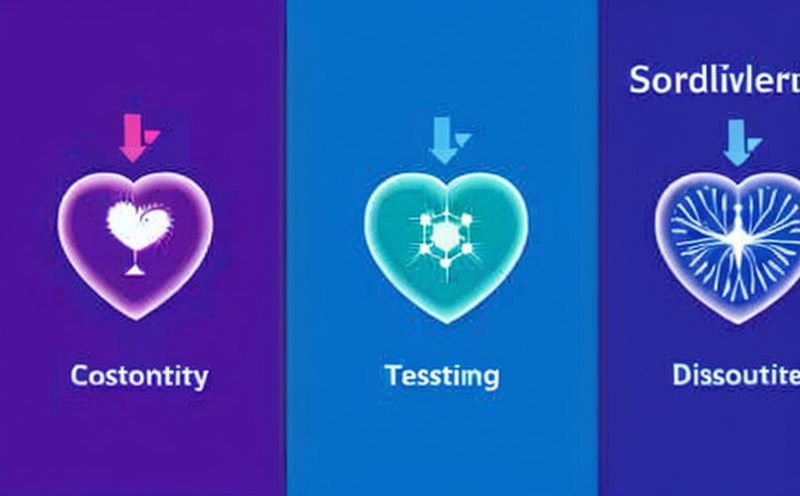Biocompatibility testing for cardiovascular devices
Ensuring Safety and Reliability Biocompatibility Testing for Cardiovascular Devices with Eurolab
In the ever-evolving landscape of medical device development, one crucial aspect that cannot be overlooked is ensuring the biocompatibility of cardiovascular devices. These devices are designed to interact directly with the human body, making it essential to verify their safety before they reach patients. Biocompatibility testing for cardiovascular devices is a rigorous process that evaluates the potential risks associated with these devices, including adverse reactions and toxicity.
At Eurolab, we understand the importance of biocompatibility testing in the development and certification of medical devices. Our comprehensive laboratory service provides expert analysis to help businesses like yours ensure the safety and efficacy of your cardiovascular devices. In this article, we will delve into the world of biocompatibility testing for cardiovascular devices, highlighting its significance, benefits, and our expertise at Eurolab.
What is Biocompatibility Testing for Cardiovascular Devices?
Biocompatibility testing for cardiovascular devices involves evaluating the potential interactions between these medical devices and the human body. This includes assessing the risk of adverse reactions, toxicity, irritation, and other biological effects. The testing process typically covers a range of parameters, including
Cytotoxicity Evaluating whether the devices materials can cause cell death or damage.
In vitro tests Assessing the potential for the device to interact with human cells in a controlled laboratory setting.
Animal studies Conducting experiments on animals to simulate real-world conditions and assess the devices safety.
Why is Biocompatibility Testing Crucial for Cardiovascular Devices?
The consequences of releasing an incompatible cardiovascular device can be severe, including
Device failure
Patient harm or death
Regulatory sanctions
Economic losses
By investing in biocompatibility testing, businesses can mitigate these risks and ensure that their devices meet regulatory requirements. Here are the key benefits of using our biocompatibility testing services for cardiovascular devices
Advantages of Biocompatibility Testing with Eurolab
Our comprehensive laboratory service offers a range of benefits to businesses developing cardiovascular devices. These include
Regulatory Compliance Ensure your device meets international standards, including ISO 10993 and FDA regulations.
Reduced Liability Minimize the risk of adverse reactions and lawsuits by verifying biocompatibility.
Increased Efficiency Our expert analysis saves you time and resources by identifying potential issues early in the development process.
Enhanced Reputation Demonstrating your commitment to safety and reliability can boost customer trust and loyalty.
Key Benefits of Biocompatibility Testing
Our biocompatibility testing services offer a range of benefits, including
Risk Management Identify and mitigate potential risks associated with device materials.
Cost Savings Reduce the financial burden of recalls, lawsuits, and regulatory sanctions.
Accelerated Development Streamline your development process by identifying issues early on.
Improved Patient Safety Ensure that your devices are safe for patients to use.
How Does Biocompatibility Testing Work?
Our biocompatibility testing process involves a range of expertly conducted tests, including
Cell Viability Assays Evaluating the potential for cell death or damage.
In Vitro Toxicity Tests Assessing the devices potential to cause harm in a controlled laboratory setting.
Animal Studies Conducting experiments on animals to simulate real-world conditions.
QA Biocompatibility Testing for Cardiovascular Devices with Eurolab
Q What is the purpose of biocompatibility testing?
A The primary goal of biocompatibility testing is to evaluate the potential interactions between cardiovascular devices and the human body, ensuring that these devices are safe for use.
Q Why is regulatory compliance essential for biocompatibility testing?
A Compliance with international standards, including ISO 10993 and FDA regulations, ensures that your device meets industry requirements and minimizes the risk of adverse reactions.
Q What benefits can businesses expect from investing in biocompatibility testing?
A Our comprehensive laboratory service offers a range of benefits, including reduced liability, increased efficiency, and enhanced reputation.
Conclusion
Biocompatibility testing for cardiovascular devices is an essential step in ensuring the safety and reliability of these life-critical medical devices. At Eurolab, our expert laboratory service provides a comprehensive analysis to help businesses like yours verify the biocompatibility of their devices. By investing in our services, you can reduce liability, increase efficiency, and enhance your reputation while ensuring that your devices meet international standards.
Dont risk patient safety or regulatory compliance choose Eurolab for your biocompatibility testing needs. Contact us today to learn more about how we can support your business.




